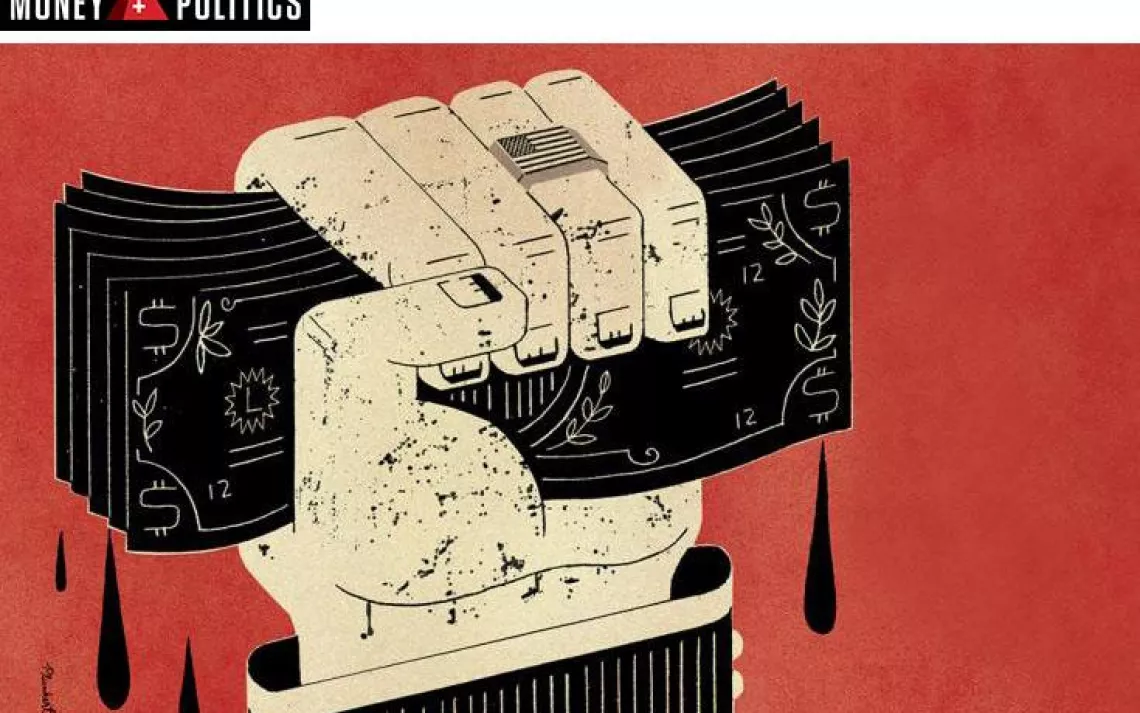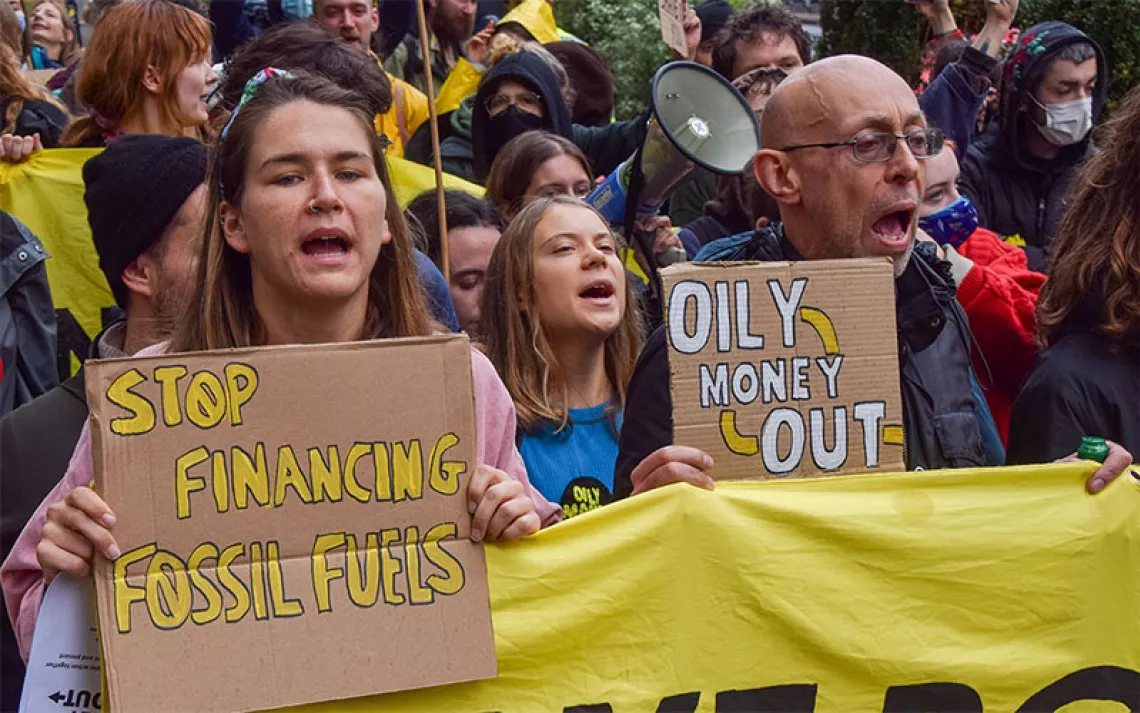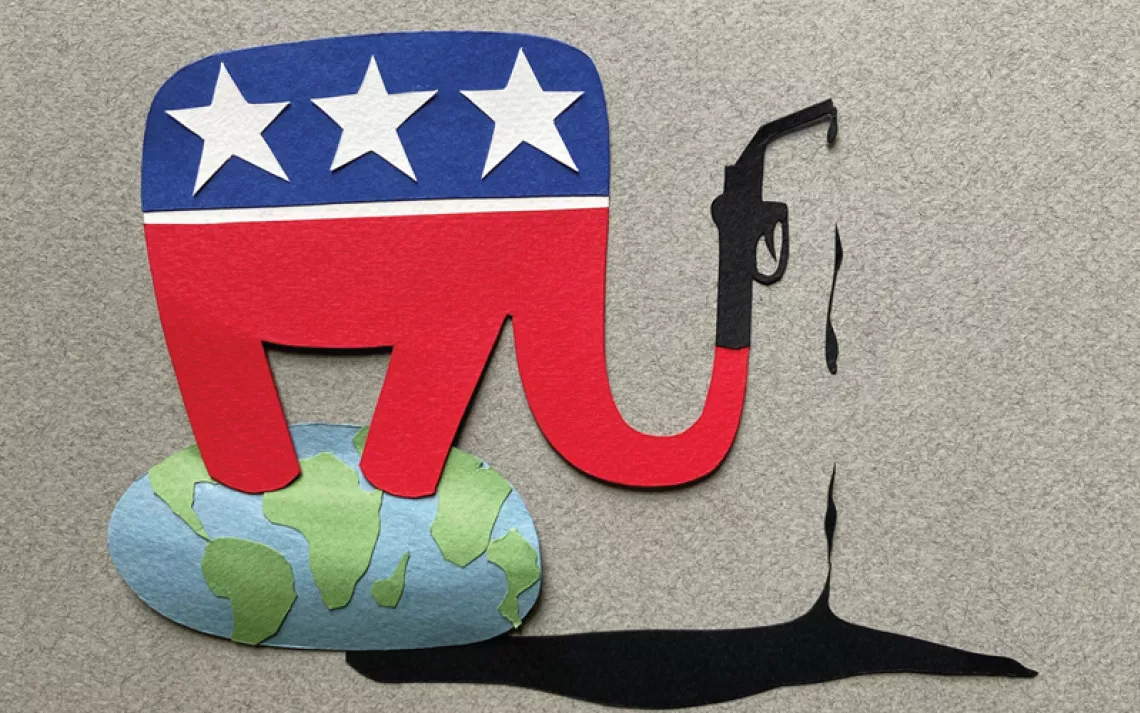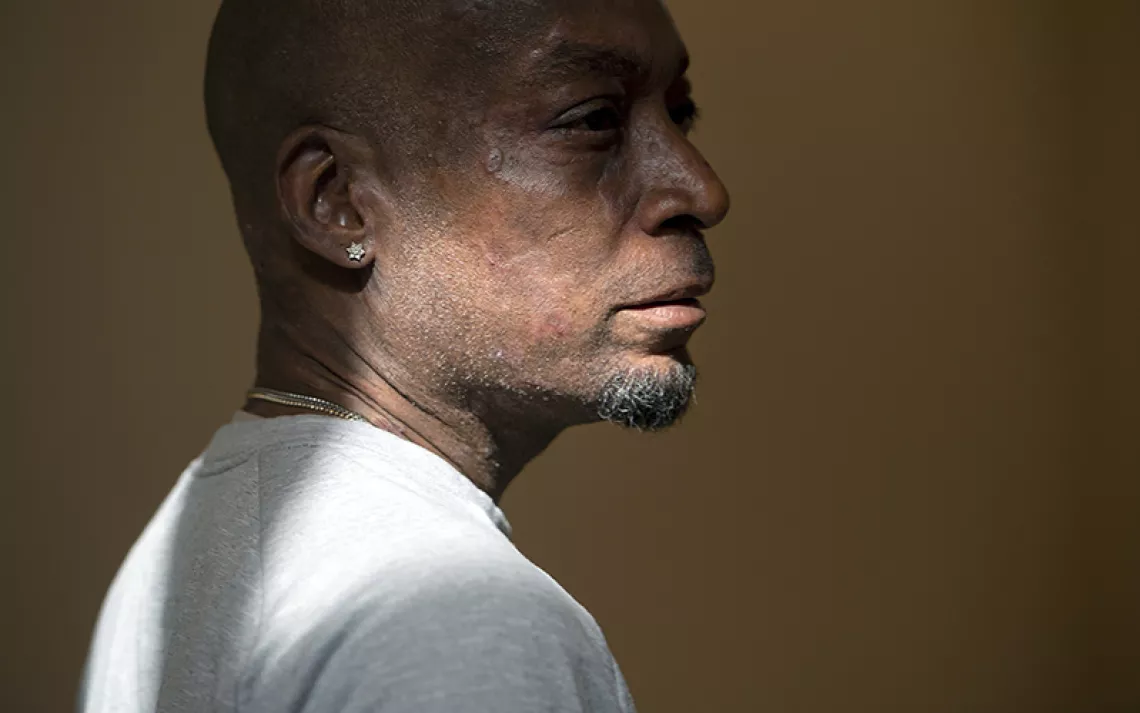The cleanup of our polluted political ecosystem will require the energy of citizens across the political spectrum
How campaign finance corruption undermines policies to protect the environment

Illustration by David Plunkert
First they came for the Socialists, and I did not speak out—because I was not a Socialist. Then they came for the Trade Unionists and I did not speak out—because I was not a Trade Unionist. Then they came . . .
So begins one of World War II's most famous poems, by the German pastor Martin Niemöeller, describing one of humanity's greatest wrongs: the Holocaust.
The poem has become a symbol for inaction in the face of great evil. But it also speaks to a blindness that affects humanity much more generally. What led Europe to its catastrophe was the absence of a certain intelligence—a strategic intelligence. That is, the ability to recognize a common threat and to respond. The capacity to see in "their" threat a threat to "us." A strategic intelligence that links what seem like disparate wrongs to a common menace.
This ability to perceive less-than-obvious relationships has always been the intelligence of the environmental movement. That movement began by recognizing the common threat to a wide range of life from a scarred or polluted environment. Ecology's most effective teaching has been the lesson of connection. Think of John Muir's often-quoted line: "When we try to pick out anything by itself, we find it hitched to everything else in the universe." How does a wrong affect all of us, in our wide range of activities? Rachel Carson's Silent Spring, in this sense, is just Niemöeller's poem in prose.
But is this an intelligence that we, as a people, can have about our democracy?
The United States is filled with passionate activists driven to solve social and economic challenges. The Sierra Club has organized such individuals for 124 years with the goal of protecting America's environment.
Others, of course, work for different causes. There are activists in the labor movement, pushing for decent wages for all workers. Others demand affordable health care. Or better schools. Or a secure social security system. Or equal access to college education. Or gun safety. Or a humane system of immigration that welcomes as citizens the people who have come to—and come to love—America.
What these activists must now see is that all these projects face a common threat: the threat of a failed and corrupted democracy.
We have allowed our republic to be captured by special interests, because we force representatives to raise the money for their campaigns from those same special interests. Members of Congress and candidates for Congress spend anywhere from 30 to 70 percent of their time raising money. Yet they don't receive that money from all of us. They receive that money from the smallest fraction of the 1 percent of us. Less than .03 percent of Americans gave the maximum contribution to candidates in 2012. That's a tiny number with extraordinary power—in a democracy.
The way we fund campaigns corrupts our democracy. It corrupts democracy by making us unequal. A recent randomized study found that senior policymakers made themselves accessible to donors three to four times more often than to non-donors. Simply put, the funders of campaigns have more power than the rest of us do.
Such inequality violates the core ideals of our republic. When James Madison described the Constitution that he had designed, he promised a Congress "dependent on the people alone." To ensure that his meaning was clear, Madison explained that by "the people" he meant "not the rich, more than the poor."
Of course, for Madison and the other founders, "the people" represented merely a sliver of the citizens that we would include today. Originally, the Constitution didn't extend political rights to women, or African Americans, or Native Americans, or even, in most states, men without property. Yet for those who were included, political power was to be equal. It is precisely this ideal of equality that we have allowed to be corrupted. For in our republic, Congress is plainly more dependent on "the rich" than on the rest of us.
Until we work together to remedy that corruption—until we can establish a democracy responsive to all of us and not just to the few—none of the critically important problems that so many decent souls fight for can be solved sensibly. So long as our Congress is dependent on the wealth of the status quo, that status quo will be preserved.
This truth is especially salient for the environmental movement. Former NASA scientist Jim Hansen writes in his latest book, "I believe the biggest obstacle to solving global warming is the role of money in politics." Let me state that truth more sharply: We will not pass sensible climate change legislation until we address the corrupting influence of money in politics. It isn't a matter of just getting the environmental movement to work harder. It is a matter of embracing a strategic, Niemöellerian insight: We must fix our democracy first if we're to have a chance to address fully the challenges facing our environment.
My point is not that environmentalists should give up environmentalism. On the contrary, I believe one should work where one's passion lies, because that is the place where one does her best work. My point is that these separate causes must recognize a simple truth: that even if we don't have common ends, we have a common enemy. To overcome that common enemy, every group striving for progressive change needs to commit a slice of its resources to the common objective of a Congress and a presidency no longer captured by money.
We should, in a word, tithe. Every group that feels its fight undermined by the power of money over voice should offer at least 10 percent of its activism to the common end of reforming this democracy. Because if unions and teachers and parents and seniors and immigrants and civil liberty activists were to embrace this common strategy with environmentalists, we would have the resources we need to make victory possible.
And victory is possible. The Supreme Court, with decisions in cases like Citizens United and Buckley v. Valeo, has made reform much more difficult. But much of this corruption could be solved with simple statutes. That's important, because getting Congress to propose a constitutional amendment in today's polarized political environment is practically impossible.
Congress could, tomorrow, change the way campaigns are funded, liberating members from dependence on large campaign contributions. That's what Representative John Sarbanes's Government by the People Act would do. His plan includes giving every citizen a $25 voucher for campaign contributions—and providing candidates with a chance to fund their campaigns with small contributions only. That kind of citizen-directed campaign finance system would radically alter the influence of oil and coal in our politics.
The problem of gerrymandering—which twists congressional districts into weird, balloon-animal shapes to protect incumbents—could also be addressed without a constitutional amendment. The Constitution gives Congress the power to decide how districts will be drawn and how votes for its members will be tabulated—and it wasn't always through single-member districts. The organization FairVote has shown how we could produce a Congress that is more representative than the one we have by adopting, as our Constitution's framers did, a system of multimember districts and adding an innovation that the framers did not consider: ranked choice voting.
As for voting itself, Congress could end the discriminatory burdens on voters by repealing voter ID laws—this generation's poll tax—and by moving Election Day to a holiday.
All of these changes would aim at a common core: a democracy that represents its citizens equally. That democracy would have the resilience to make real change possible. Critically, none of these reforms would require a constitutional amendment. Every one of them could be enacted immediately—if only we could work together to build the movement that would force Congress to act.
In 1903, John Muir showed Teddy Roosevelt Yosemite Valley and the Mariposa Grove's giant sequoias. Roosevelt's trip across the West, taken just after an assassin's bullet had made him president, convinced T.R. that our natural heritage needed a federal protector. Roosevelt the reformer understood that our natural heritage needed protecting from, above all, the politics of the Gilded Age, a politics corrupted by money. He fought to remove the Grand Canyon and Yosemite from the economy of the marketplace by fighting to remove politics from the economy of the marketplace. He knew that right could win when its opponent was wrong—at least if the judge was not dependent on money from the wrong.
Shortly after Muir's death, Roosevelt, in a remembrance about his trip to Yosemite, wrote that Muir was "not interested in the small things of nature unless they were unusually conspicuous. Mountains, cliffs, trees, appealed to him tremendously, but birds did not." It was Roosevelt, in fact, who looked beyond "the small things" of politics to the "mountains" and "cliffs" of our democracy when he helped launch the movement to reclaim the democracy of his day from the corruption of money.
That's the same task we have today. The environmentalism that inspired Roosevelt may well have given us America's first great fight against the corrupting influence of money in politics. Now, we must wage that battle again to make possible a much more significant environmentalism.
In this fight, the hardest truth may be this: It won't be waged by politicians, at least at first. This election has been dominated by talk of corruption. Both Donald Trump and Bernie Sanders made it a central part of their campaigns. But neither used this election to show America that change is possible. Trump has never described a solution—save electing a billionaire. Even Sanders shied away from pressing for public funding of elections, insisting instead that it be something we move to "over the long term."
We can't wait for the long term. Because our planet can't wait for the long term. We must recognize, through insight like that of Pastor Niemöeller, how environmentalism must proceed—fighting for a democracy first, so that right has at least a fighting chance to defeat what every environmentalist knows is just wrong.
This article appeared in the September/October 2016 edition with the headline "All Together Now."
WHAT YOU CAN DO
Help get big money out of politics by becoming a citizen co-sponsor of the Government by the People Act, which would create a new system for public financing of elections. sc.org/cleanelections.
 The Magazine of The Sierra Club
The Magazine of The Sierra Club



